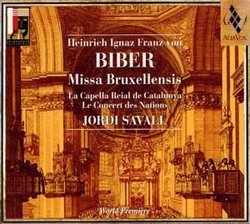| All Artists: Heinrich Ignaz Franz von Biber, Jordi Savall, Le Concert des Nations, La Capella Reial de Catalunya Title: Biber: Missa Bruxellensis Members Wishing: 1 Total Copies: 0 Label: Alia Vox Spain Release Date: 1/11/2000 Album Type: Import Genre: Classical Styles: Opera & Classical Vocal, Historical Periods, Baroque (c.1600-1750), Early Music Number of Discs: 1 SwapaCD Credits: 1 UPC: 713746146429 |
Search - Heinrich Ignaz Franz von Biber, Jordi Savall, Le Concert des Nations :: Biber: Missa Bruxellensis
 | Heinrich Ignaz Franz von Biber, Jordi Savall, Le Concert des Nations Biber: Missa Bruxellensis Genre: Classical
|
Larger Image |
CD Details |
CD ReviewsThe Glory of Barock and Contra-Reformation J. Slanina | Schagen, The Netherlands | 02/27/2000 (5 out of 5 stars) "Heinrich Ignaz Franz, Freiherr von Biber has only recently been rediscovered as a very important composer of religious music, mainly music for specific catholic services.Biber generally chooses fantastic complex forms to express his musical thoughts Biber is not only a typically high-barock composer, his misc is also representative for the contra-reformation as occurring at that time in South Germany and Austria. Biber composes masses for 19, 23 and even up to 53 voices, to project the glory of the church. He uses the "concertato" form, different instrumental and vocal choirs. In this magnificent rendering by Savall, recorded in the very church Biber used, this style is performed to perfection. It is immediately clear that the members of this Austrian/Southern Germany school of composers, such as Biber together with e.g. Schmelzer, are direct descendants of the Venatian composition style starting with Willaert, culminating in Andrea and Giovanni Gabrieli and Ludovico da Viadana. Any lover of extravert high-barock music should listen to this perfect rendering of this mass for 23 voices. Savall is, of course one of the best European directors for old music, but the combination of the choice of the location which dictates a ceretain way of performing, together with very good vocal and instrumental soloists make this performance really outstanding." A gorgeous gem Michael S. Swisher | Stillwater, Minnesota USA | 05/29/2002 (5 out of 5 stars) "Baroque music often has a conventional and predictable character - think of Telemann, or Biber's fellow composer at the Salzburg court, Muffat. This is never so with the music of H.I.F. von Biber. His range of compositional technique was much broader than that of his contemporaries, and can only be called dazzling. A celebrated violinist, he is best known for his string compositions like the "Rosary" sonatas and "Mensa sonora." Several recent recordings of his Masses show him to have been equally adept at composition for human voices. To the Musica Antiqua Köln/Gabrieli Consort recording of his Missa Salisburgensis and the Gustav Leonhardt renditions of his two Requiems on DGG recordings must now be added Jordi Savall's recording of the Missa Bruxellensis.Simpler (for only 23 voices) than the Missa Salisburgensis (which was for 52), this Mass was the last Biber is known to have composed. Nonetheless this is still a very grand and sumptuous piece reflecting the church militant and triumphant, composed for the inauguration of the knightly order of St. Rupert, and representing the height of the counter-reformation æsthetic. The performance is very well rendered by La Capella Reial de Catalunya and Le Concert des Nations, and is distinguished by having been recorded in the cathedral of Salzburg, where it was originally presented three centuries ago under the composer's direction. Amidst the pomp and complexity of the piece, melodic beauty is never absent. Biber can dazzle and startle, but he also charms with his tunefulness. In this he looks ahead to his famous successor at Salzburg - Mozart. This is a lovely recording." A massive Mass... ewomack | MN USA | 10/07/2003 (5 out of 5 stars) "If you're looking for a BIG BIG sound, here it is. Recorded live in Salzburg cathedral, the orchestra and choir reverberate and bounce around like a huge gathering of harmonious spelunkers testing echoes in the bowels of some great cavern. It's interesting to hear the interplay of architecture and the compositional form. Biber must have ran numerous tests on the acoustics of the cathedral interior to determine the longest possible length of passages and which harmonies would sound pleasing and which would turn into absolute goop. This begs the question: would this piece be enjoyable if performed outside of the cathedral? The question is moot in the context of this great CD and the gorgeous natural reverb that it captures.The Kyrie is triumphant and proud, not yearning or longing, which is a change from most of the masses I've heard from other composers. Regardless, the music throughout is wonderful and puts the catheral to good use. Trumpets blare with the choir, and the strings blend in (they arguably get a little buried in the mix) with the musical strata. The effect is unforgettable.The CD booklet contains some background information - such as the origin of its name - of the work (in 6 languages), page samples from Biber's mammoth score, the full Latin text of the work, and pictures and diagrams of Salzburg cathedral's interior. AliaVox rarely disappoints."
|

 Track Listings (5) - Disc #1
Track Listings (5) - Disc #1